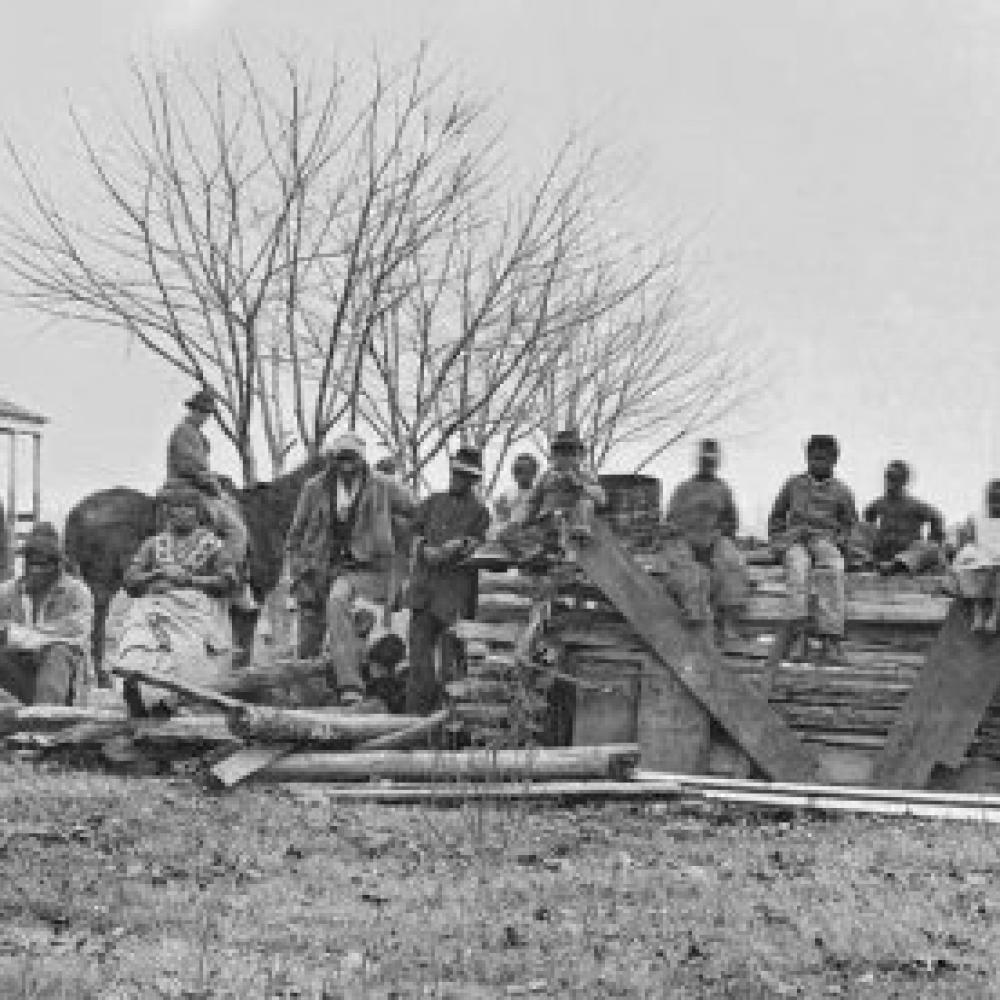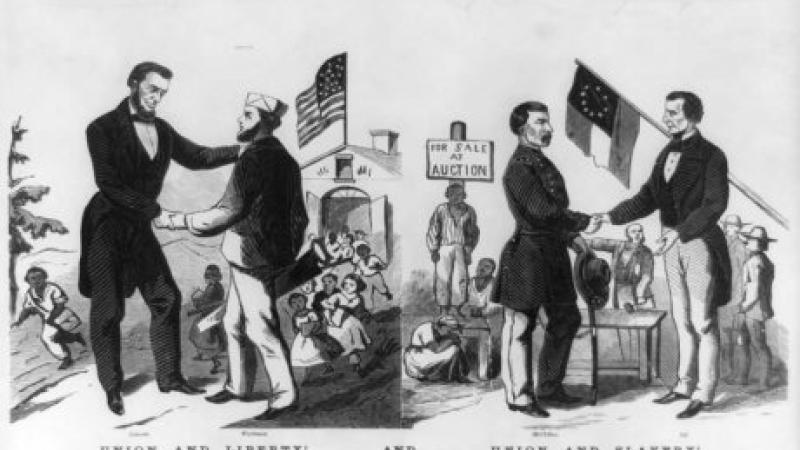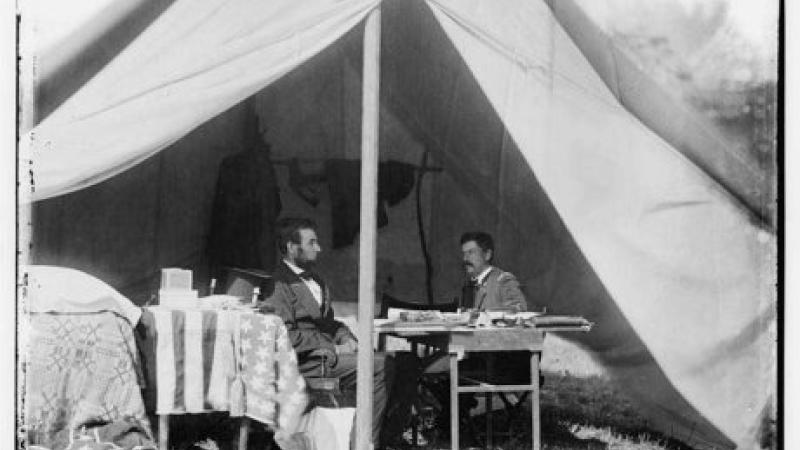One hundred and fifty years after the start of the Civil War, there is still no better way to gauge its fatefulness than by comparing the first and second inaugural addresses of Abraham Lincoln. The First Inaugural, delivered on March 4, 1861, was already a speech to a divided country: South Carolina had begun its secession proceedings almost as soon as Lincoln was elected the previous fall, and before he took office the Deep South followed her out of the Union. But no shots had yet been fired—the Confederate attack on Fort Sumter was still a month in the future—and you can hear in Lincoln’s words his urgent hope that somehow the South could be persuaded back.
Accordingly, the very first item on the new president’s agenda was to promise that he would not abolish slavery. “I have no purpose, directly or indirectly, to interfere with the institution of slavery in the States where it exists,” he proclaimed. “I believe I have no lawful right to do so, and I have no inclination to do so.” In keeping with his oath to the Constitution, Lincoln refused to acknowledge the right of the Southern states to secede, but he did everything possible to avoid the threat of force. If a civil war came, Lincoln concluded, it would not be the fault of the president, the Republican party, or the North. “The government will not assail you,” he promised his “dissatisfied fellow countrymen.” “You can have no conflict, without being yourselves the aggressors.”
Four years later, when Lincoln took the presidential oath for the second time, the war he tried to avoid was just over a month from its conclusion. And it had turned out to be something much more terrible than Lincoln, or anyone, could have imagined in 1861. More than 600,000 Americans were dead; whole regions of the country were ravaged and burned. Perhaps most unexpected of all, the president who had begun by promising not to interfere with the institution of slavery had emerged as the Great Emancipator. A war to preserve the Union had become a war to end American slavery.
A different president might have made the Second Inaugural the occasion for a victory speech, or at least a moralizing and didactic one, explaining how the North’s virtue had gained it God’s favor. Lincoln’s genius—literary as well as political—lay in his willingness to make his speech, instead, an expression of the nation’s trauma. The Second Inaugural, like the Gettysburg Address, has a stunned, muted brevity. In America’s War, a new anthology of Civil War documents and readings edited by Edward L. Ayers and copublished by the National Endowment for the Humanities and the American Library Association, the First Inaugural takes up nine pages; the Second, less than two.
That is all the space Lincoln needed to describe his sense that the war, far from being a triumph of North over South, was in some obscure sense a necessary judgment on America as a whole. It was necessary, he concluded, for one reason only: “If we shall suppose that American Slavery is one of those offenses which, in the providence of God, must needs come, but which, having continued through His appointed time, He now wills to remove, and that He gives to both North and South, this terrible war, as the woe due to those by whom the offense came, shall we discern therein any departure from those divine attributes which the believers in a Living God always ascribe to Him?”
The moral and intellectual journey that Lincoln made between 1861 and 1865 is one that took America more than a century to complete. This was the journey to understanding that the central meaning of the Civil War—and one of the central themes of American history—was the evil of slavery, racism, and white supremacy. By now, that understanding is shared by almost all scholars of the Civil War, and most laypeople as well. Certainly, it informs the selections in America’s War, whose subtitle is “Talking About the Civil War and Emancipation on their 150th Anniversaries.” In his preface, Jim Leach, the chairman of NEH, makes the point clear, writing that “emancipation is the central theme of America’s War.”
Accordingly, the volume gives plenty of space to contemporary observers who saw the war primarily in terms of racism and slavery. In the North, these were the abolitionists—men like Frederick Douglass, whose famous speech “What To the Slave is the Fourth of July?” is the second document in America’s War. Speaking to an audience in Rochester, New York, in 1852, Douglass audaciously disclaimed any connection with the nation’s birthday: “What have I, or those I represent, to do with your national independence? Are the great principles of political freedom and of natural justice, embodied in that Declaration of Independence, extended to us?”
Seen in these terms, as an intolerable violation of American values and human rights, slavery could not be an “institution,” or a merely political issue. It was an evil to be fought, with violence if necessary. Thus Douglass’s speech is followed in the anthology by Henry David Thoreau’s eulogy for John Brown, the antislavery terrorist whose aborted uprising in Harpers Ferry was almost universally condemned. “I read all the newspapers I could get,” Thoreau says, “and I do not remember in them a single expression of sympathy” for Brown and his small band of followers. Even “Republican editors . . . call these men ‘deluded fanatics’—‘mistaken men’—‘insane,’ or ‘crazed.’” It was with the intention of outraging public opinion, then, that Thoreau compared Brown to Oliver Cromwell and Jesus Christ, praising him as a zealot for God, “the bravest and humanest man in all the country.”
On the other side of the moral and geographical divide, Douglass and Thoreau found a counterpoint in Alexander H. Stephens, the vice president of the Confederacy. Stephens was one of the few Southern politicians to take up the abolitionists’ challenge directly and throw it back in their faces. Yes, Stephens declared in his notorious “Cornerstone” Speech of March 1861, the issue facing America was race and slavery; and the Confederacy was willing to take its stand on the grounds of white supremacy. “Its foundations are laid, its corner-stone rests,” Stephens asserted, “upon the great truth, that the negro is not equal to the white man; that slavery—subordination to the superior race—is his natural and normal condition. This, our new government, is the first, in the history of the world, based upon this great physical, philosophical, and moral truth.”
Reading these selections in America’s War, the modern reader finds himself on historical ground that is easy to navigate. The Civil War, it seems, was a fight between racists and antiracists; the best men were the fiercest opponents of slavery, and the worst were its most brazen defenders. Yet, while this may be the way we understand the war in the year 2011, as a historical picture it misleads in its very clarity. It gives us the sense that, because the right and wrong sides of the conflict were so clear, we ourselves—with our impeccable opposition to racism—would certainly, had we lived in 1861, have cheered Douglass and hissed Stephens. Surely we would not have been among those Republicans denounced by Thoreau, who opposed slavery yet also condemned John Brown; or among the Northern majority who disliked slavery, but did not seek to abolish it; or among those pragmatists who, like Lincoln, were willing to give slavery a permanent guarantee in order to preserve the Union.
Another new Civil War anthology, The Civil War: The First Year Told by Those Who Lived It, edited by Brooks D. Simpson, Stephen W. Sears, and Aaron Sheehan-Dean, helps us see why such confidence is unwarranted. This volume, the first of four to be published by the Library of America on the anniversary of each year of the war, offers a greater bulk and density of material than America’s War. That makes it less suited to the latter book’s stated goal of provoking popular discussion about the Civil War; but it does allow the reader to follow contemporary debates about the war in what feels like real time. The Civil War, like America’s War, includes Lincoln’s First Inaugural and Stephens’s “Cornerstone” Speech, but it also takes in dozens of speeches by lesser politicians, North and South, as well as newspaper reports, diaries, letters, and eyewitness accounts of the major battles of 1861, including Fort Sumter and Bull Run.
Reading these documents, we are plunged into a world that is strangely like our own in its lack of moral and political clarity. Certainly, few Southerners were as willing as Stephens to come right out and base the justice of secession on white supremacy—a reluctance that bespeaks a deep, perhaps unconscious sense that this was morally untenable ground. The very first document in the book, an editorial calling for secession—published in the Charleston Mercury three days before Lincoln’s election—speaks instead of “the broad ground of Southern security,” “the evils of submission,” and the “sectional madness of the North.”
Thus early began the tendency, which grew more pronounced as events grew more urgent, for Southerners to see themselves as victims of the North. So thoroughly were they convinced of their victimhood that their most aggressive measures—culminating in the preemptive dissolution of the Union before Lincoln had made a move against slavery or even taken office—could be viewed as self-defense. Take Joseph E. Brown, the governor of Georgia, who wrote in December 1860 that Lincoln’s election is “the triumph . . . of Northern fanaticism over Southern equality and Southern rights.” In this way, Brown co-opted the emotionally powerful rhetoric of rights and equality for the South—that is, for a polity founded on denying rights and equality to much of its population.
Moments like this, and there are plenty of them in The Civil War, are a valuable reminder that the conviction of being wronged is always the pretext for the greatest wrongs, and that the corruption of language can prevent human beings from even recognizing the true nature of their own actions. These are lessons that have not grown less timely in the last 150 years.
But while men and women can deceive themselves, the words they write are guaranteed to reveal them in time. The great human drama of these anthologies lies in the way American characters are tested, and often enough found wanting, under the pressure of history. Even if you knew nothing about the subsequent career of General George McClellan— his delays and failures as a commander, his Copperhead campaign against Lincoln in the 1864 election—you could judge his worth from the letters he wrote to his wife in the first year of the war, when he was rising to the head of the Union ranks. In August 1861, McClellan writes home that the head of the Union Army, Winfield Scott, is “a dotard or a traitor,” and “the Presdt [sic] is an idiot.” He brags about the letters he receives urging him to “save the nation,” and weighs the comparative attraction of “Presidency, Dictatorship, etc.” In short, he is a vain and sinister figure, who exposes himself in every word he writes.
There could be no stronger contrast with the man he despised, Abraham Lincoln. We can hear Lincoln’s true note as early as December 1860, three months before the inauguration, when he responds to a request from a North Carolina congressman for a “clear and definite exposition” of his views on slavery. Quietly but confidently, Lincoln refuses to give one: His views are well known, he writes, and “any additional production of mine . . . would make me appear as if I repented for the crime of having been elected, and was anxious to apologize and beg forgiveness.” Here is a glimpse of that steely resolve, including a large measure of simple resignation, which allowed Lincoln to pursue his course through the most intense criticism and the most terrible setbacks. It even gave him mastery over his own death. For when Lincoln was killed, just days after Lee’s surrender, it could be no more than a redemption of the promise he pledged in the Second Inaugural: “Fondly do we hope—fervently do we pray—that this mighty scourge of war may speedily pass away. Yet, if God wills that it continue, until all the wealth piled by the bondsman’s two hundred and fifty years of unrequited toil shall be sunk, and until every drop of blood drawn with the lash, shall be paid by another drawn with the sword, as was said three thousand years ago, so still it must be said, ‘the judgments of the Lord are true and righteous altogether.’”




